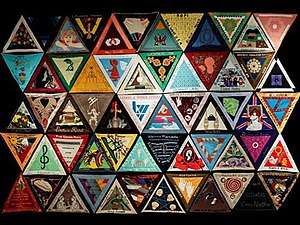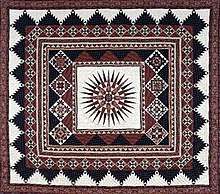International Honor Quilt
The International Honor Quilt (also known as the International Quilting Bee) is a collective feminist art project initiated in 1980 by Judy Chicago as a companion piece to The Dinner Party.[1][2] The piece is a collection of 539 two-foot-long quilted triangles that honor women from around the world.[3] Through the Flower, Chicago's not-for-profit organization, gifted the collection to University of Louisville Hite Art Institute in 2013 to be available for research and to exhibit.[1]
| International Honor Quilt | |
|---|---|
| Also known as International Quilting Bee | |
 A section of the International Honor Quilt | |
| Artist | Judy Chicago |
| Year | 1980 |
| Type | Collective feminist art project |
| Medium | Quilt pieces |
| Owner | The Hite Art Institute |
| Website | International Honor Quilt |
Background
Creation
In Judy Chicago's autobiography, Beyond the Flower, she discusses initiating the International Quilting Bee, stating that "people would be invited to submit their triangular quilts. . .honoring women of their own determination. By doing this, I intended to provide an opportunity for community participation and also to counter another criticism that had emerged, this time about my choices of women."[4]
Community collaboration
Individual Quilt panels were often created by groups of women after viewing or hearing about Chicago's Dinner Party . For example, a group from the Chrysallis Center at Saginaw Valley State University, Michigan, visited the Dinner Party exhibition in Chicago in 1981. Returning to Saginaw via bus that evening, they decided they needed to create a quilt panel and submit it to the project. Under the leadership of Rosalie (Riegle) Troester, an English instructor at the University, and Trish Nowicke, Campus Minister, a group of fourteen students created a multicolored butterfly wing (IQB-352) representing the growth stage it symbolizes as well as the student career counseling and support center of which they were members. They completed the project and forwarded their creation to Through the Flower for display in the next Dinner Party venue, Montreal.[2]
Description
The International Honor Quilt is a collection of 539 panels of triangular quilts honoring women, women's organizations, and women's issues.[5]
Women represented
Mythological, religious, fictional
- Isis
- Virgin Mary
- Eve
- Deborah
- Loch Ness Monster
- Demeter
- Persephone
- Nancy Drew
Well-known women
- Imogen Cunningham
- Helen Keller
- Louise Nevelson
- Annie Oakley
- Mother Teresa
- Mary Cassatt
- Frida Kahlo
- Abigail Adams
- Billie Jean King
- Pearl S. Buck
- Agatha Christie
- Elizabeth II
- Sonia Delaunay
- Marie Stopes
- Maria Montessori
- Joan Baez
- Anne Frank
- Joan of Arc
- Eleanor Roosevelt
- Winnie Madikizela-Mandela
- Corrie ten Boom
- Nikki Giovanni
- Margaret Sanger
- The Pointer Sisters
- Betty Friedan
- Marie Curie
- Paula Modersohn-Becker
- Emily Brontë
- Anna Pavlova
- Judy Chicago
- Anaïs Nin
- Kathe Kollwitz
- Florence Nightingale
- Rachel Carson
- Georgia O'Keeffe
- Sojourner Truth
- Sandra Day O'Connor
- Margaret Atwood
- Janis Joplin
- Gertrude Stein
- Eva Hesse
- Jane Addams
- Isadora Duncan
- Edna St. Vincent Millay
- Joy Adamson
- Lorena Hickok
- Ellen Powell Tiberino
- Pearl Chase
- Nellie McClung
- Emily Carr
- Fumiko Kaneko
- Ana Lupas
- Ruth Asawa
- Vonda N. McIntyre
- Sophie Scholl
- Emmy Noether
- Rebecca Nurse
- Dame Cicely Saunders
- Emma Lazarus
- Hannah Szenes
- Chiang Ching
- Nancy Crow
- Katie Sandwina
- Mary Daly
- Mary Anning
Women's groups and organizations
- Shakers
- American Association of University Women (A.U.W.) (several panels)
- National Organization for Women (N.O.W.) (several panels)
- League of Women Voters
- East Bay Heritage Quilters
Countries represented
Women from around the world wanted to be a part of the feminist spirit of The Dinner Party as it toured. Twelve countries are represented with over 136 known municipalities. The University of Louisville's Digital Archives has detailed information about locations of all the quilt pieces.[6]
- United States – (35 known locations)
- Canada – 105
- Australia – 30 (21 known locations)
- Germany – 27
- England – 12
- India – 5
- Austria – 3
- Scotland – 3
- Romania – 2
- South Africa – 2
- Israel – 1
- Japan – 1
References
- "Feminist quilt to be displayed at U of L". The Courier-Journal. Retrieved 2016-03-15.
- "'International Honor Quilt' given to U of L". The Washington Times. Retrieved 2016-03-15.
- Gerhard, Jane F. (2013-06-01). The Dinner Party: Judy Chicago and the Power of Popular Feminism, 1970–2007. University of Georgia Press. p. 196. ISBN 9780820336756.
- Chicago, Judy (1996). Beyond the Flower: The Autobiography of a Feminist Artist. New York: Penguin Group. pp. 79. ISBN 0-670-85295-3.
- "Extending the Spirit of The Dinner Party: The International Honor Quilt," University of Louisville, Hite Art Institute, 2015 (brochure)
- "International Honor Quilt Collection". digital.library.louisville.edu. Retrieved 2016-03-19.
